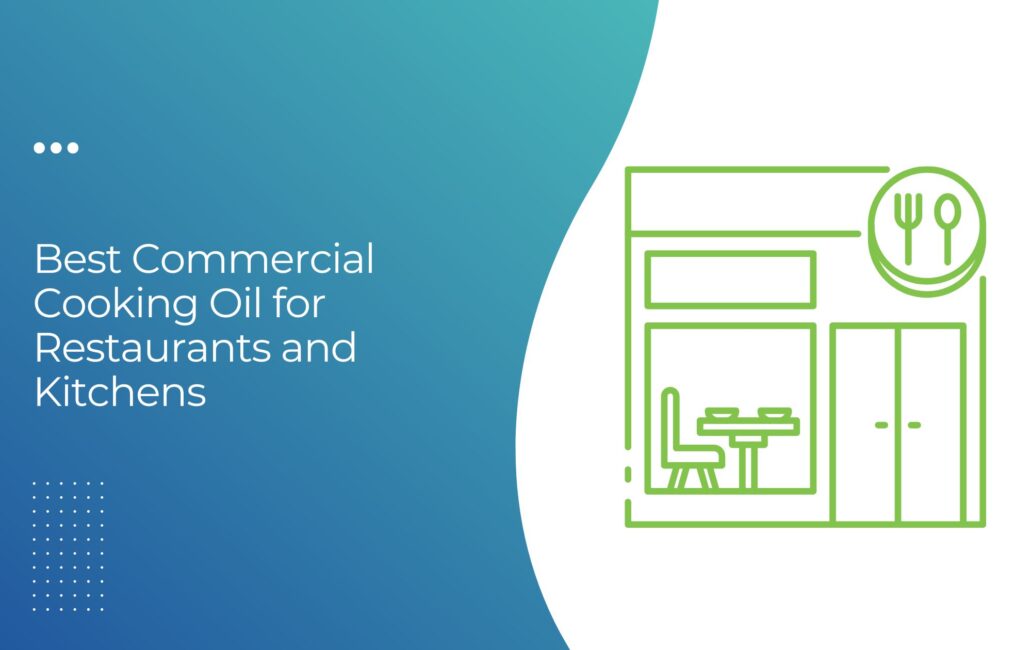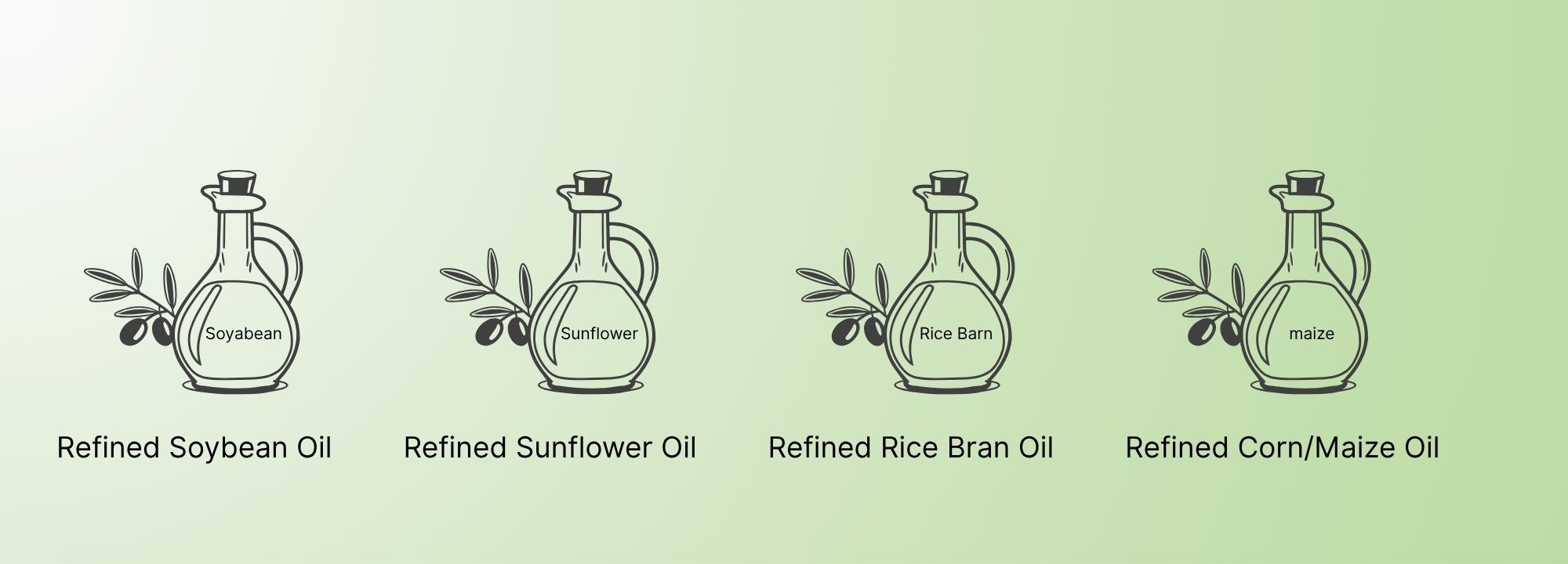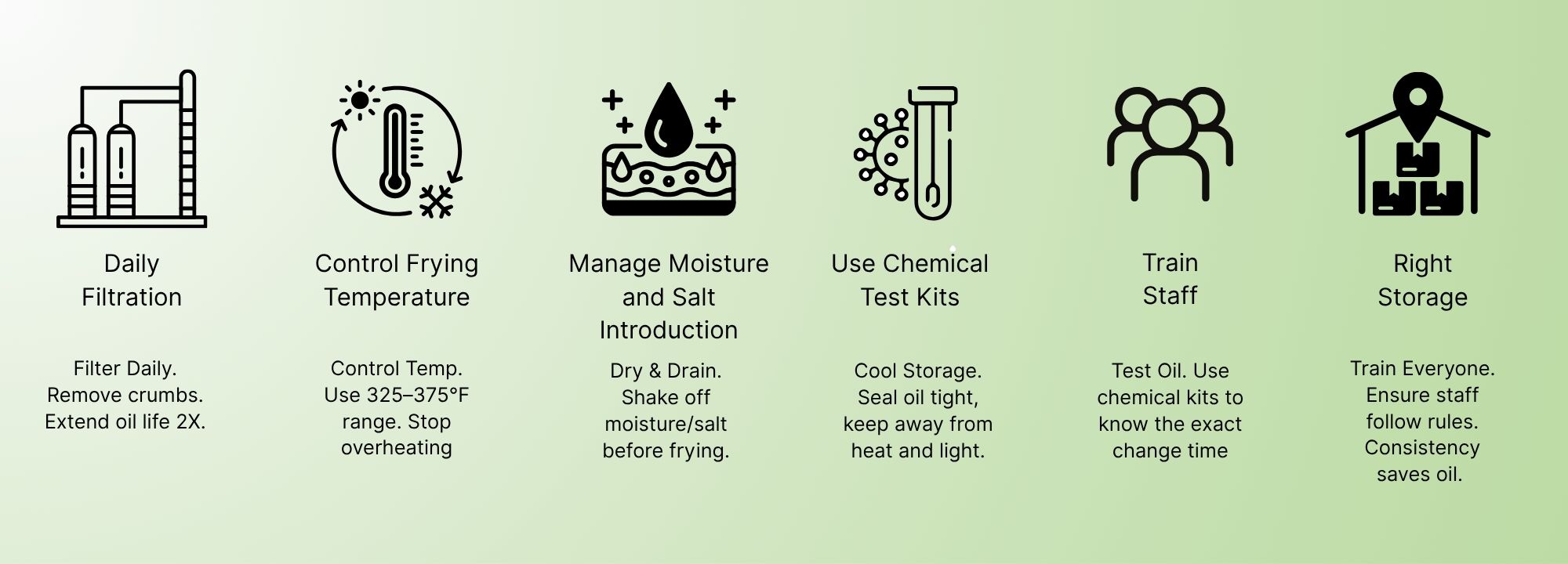Best Commercial Cooking Oil for Restaurants and Kitchens

In the food service industry, every ingredient choice is a vital decision. And choosing the best cooking oil for restaurants is one such major decision, as it affects flavor, texture, and even the appearance of dishes. Furthermore, as per ResearchAndMarkets, the global food service industry is going to hit US$5.1 trillion by the end of 2030. Hence, as a result, the demand for bulk, high-quality, and reliably sourced ingredients, particularly foundational commodities like cooking oil, will increase. This makes it necessary to secure a stable, compliant, and cost-effective supply chain for commercial cooking oil. Along with working with trustworthy suppliers, it’s equally important for restaurant owners and commercial kitchen operators to know which oil is best for their meals and audience’s taste preferences.
So, this restaurant cooking oil guide discovers essential factors, types, and procurement strategies for commercial cooking oil to ensure your kitchen operates at peak performance.
Why Choosing the Right Cooking Oil Matters
Cooking oil for the food service industry, like restaurants and commercial kitchens, is not just an investment. Rather, it’s an investment.
Flavor and Food Quality
Oil serves as a flavor carrier, while the neutral oil enables the natural ingredients to shine. Flavorful oils (for example, extra virgin olive oil or peanut oil) become part and parcel of the dish’s profile.
- Smoke Point Degradation: When oil breaks down, it adds acrid, burnt, or rancid off-flavors to the food, which ultimately decreases food quality and customer satisfaction.
- Textural Consistency: High-performance cooking oil for restaurants ensures the proper oil minimizes oil absorption in the batter, therefore creating delightfully crisp and golden food on the outside, while still being moist and tender on the inside. However, a poor choice in oil will create greasy, soggy, unappealing food.
Cost Efficiency and Operational Lifetime
Commercial cooking oil is one major and recurring expenditure. It is crucial to choose oils with high oxidative stability. Oil with high oxidative stability can be filtered and reused in deep fry applications, which ultimately reduces frequent, costly changes.
Health, Safety, and Regulatory Compliance
Today’s consumers are more conscious about health, so they pay attention to ingredients and safety. This ultimately makes it crucial for restaurants and commercial kitchens to look at:
- Trans-Fat Regulations: Several regions have enforced strict limits on partially hydrogenated oils due to trans-fat concerns. Food service operations must utilize oils that meet the requirements for healthier oils.
- Nutritional Properties: Oils high in monounsaturated or polyunsaturated fats (e.g., Rice Bran Oil, Sunflower oil, etc.) can present themselves as a healthier oil choice based on a desire for high nutritional properties.
- Food Safety: The degradation of oil creates polar compounds, as well as free fatty acids (FFA). High levels of compounds show degraded quality and potential health effects. When dealing with oil and frying applications, careful attention must be paid to QA procedures and timely disposal of oil and fat-based products.
Types of Commercial Cooking Oil
Every restaurant or commercial kitchen has its specific requirements, different menus, and customer preferences. Hence, it’s vital to understand different edible oil types and their uses:
1. Refined Soybean Oil
Soybean oil is one of the top oils for frying in restaurants across the world. Also, it’s very affordable, neutral in flavor, and highly versatile. This oil is often used in food manufacturing, salad dressings, sauces, and general-purpose cooking (sautéing, pan-frying). Its high volume and low cost make it ideal for establishments with very high oil consumption.
2. Refined Sunflower Oil
It is very light in color, with neutral flavor and high monounsaturated fats, and is known for its excellent heat stability. It is often used for deep frying, poultry, and offers reliable and crisp results.
3. Refined Rice Bran Oil
It is known for its elevated smoking point (about 490°F or 254°C) and for a beneficial component called Oryzanol, which provides excellent oxidative stability and anti-inflammatory properties.
Its applications include deep frying and high-heat cooking applications such as wok stir-fries or searing, providing a better health profile and a longer fry life, which can mitigate the high cost.
4. Refined Corn/Maize Oil
This oil often tastes light, has excellent clarity, and a solid smoke point. It is widely used in baking, light frying, and as an ingredient in margarine, shortening, and industrial products due to its consistent performance and wide availability.
Key Factors to Consider When Selecting Commercial Cooking Oil
Restaurant operators should think about how oil performs, how much it costs, and how long it lasts while deciding the best cooking oil for restaurants.
Smoke Points
It is the temperature at which oil starts to break down and release smoke. After crossing this stage, oil produces harmful compounds and off-flavors.
Oils such as soybean, peanut, corn, and canola have smoke points higher than 400°F, which makes them ideal for frying. Olive oil is a healthful oil, but its lower smoke point limits its use in dressings or low-heat cooking. Special blend oils are often designed for higher smoke points while extending fry life.
Ultimately, when restaurant businesses understand smoke points, they can make the right choice.
Cost and Budget Planning
For any restaurant, food cost is one of the major expenses, and commercial cooking oil is a recurring investment. And its price can vary depending on different factors like type, availability, packaging style, and size. Among all, soybean and corn oil are generally the most affordable, while peanut oil and olive oil may cost more.
For effective budget planning, operators need to consider the cost per pound of food fried, not just the cost per gallon of oil. Also, remember, some oils may cost higher initially, but offer long-term benefits by reducing waste.
Oil Stability and Shelf Life
Oil stability is how it holds up under multiple heating cycles and during storage. Usually, oils with high polyunsaturated fats break down faster. On the flip side, oils with rich monounsaturated fats are more stable.
Stability has a direct influence on:
- Flavor consistency
- Fryer management
- Shelf life
Most commercial cooking oils are refined, which ultimately helps improve their shelf life and makes them more flavor-neutral.
Regulatory Compliance and Documentation
For B2B buyers, proof of quality is crucial. So, when looking for the best cooking oil for restaurants, check the certification like FSSAI (India), AGMARK, BIS, and Codex for export/import.
Furthermore, your potential procurement managers must provide detailed documentation, like Certificates of Analysis (COAs), detailing the Free Fatty Acid (FFA) value and peroxide value (PV) for every batch.
Comparing Oils: Performance and Use Cases
Choosing the best cooking oil for restaurants involves matching its technical specifications to the required cooking task.
<!doctype html>
Cooking Oil Applications — Quick Reference
Compact guide to ideal oil types, performance factors and why they work.
| Cooking Application | Ideal Oil Type(s) | Key Performance Factor | Why it Works |
| Deep Frying (High Volume) | Sunflower (High-Oleic), Palm Olein, Rice Bran Oil | High Smoke Point, Oxidative Stability, Low Foaming | Maintains consistent quality over long fry cycles and high temperatures, ensuring a crisp product. |
| General Purpose Sautéing | Refined Soybean Oil, Refined Corn Oil | Neutral Flavor, Consistent Availability, Cost-Effectiveness | Versatile for starting bases, pan-frying, and moderate heat applications without affecting food flavor. |
| Salad Dressings & Finishing | Olive Oil (Extra Virgin), Cold-Pressed Peanut Oil, Sesame Oil | Distinct Flavor Profile, Aroma, Nutritional Value | The oil is consumed raw, so flavor, color, and texture are the primary considerations. |
| Baking and Shortening | Refined Corn Oil, Refined Soybean Oil | High Volume, Emulsification Properties, Neutral Taste | Provides structure and moisture without imparting strong flavor; often used in blended shortening. |
Tips to Maintain Oil Quality in Commercial Kitchens
Sometimes, even the best-sourced commercial cooking oil will degrade rapidly if not managed accurately. So, here are the best tips to maintain the oil quality in restaurants and other commercial kitchens:
Daily Filtration
Food particles like crumbs can cause oil breakdown by increasing the concentration of free fatty acids. So, it is better to implement a strict routine of filtering oil twice every day with a top-notch filtration machine.
Control Frying Temperature
Overheated oil can ruin it, so never exceed the frying temperature (typically 350°F or 175°C). Also, it is good to turn the fryer off or a standby temperature during slow periods to prevent unnecessary heating.
Manage Moisture and Salt Introduction
Water is the main catalyst for hydrolysis, which is when oil interacts with water, resulting in free fatty acids. To avoid this, keep salt and seasoning away from the fryer as these can also accelerate breakdown.
Right Storage
Stored oil should be protected from heat, light, and air. Hence, always store it in cool and dry places in sealed containers. Also, discard oil when TPC or FFA reaches the safety threshold.
Use Chemical Test Kits
Don’t rely on smell alone. Professional kitchens should use test strips or any electronic oil monitor to measure the total polar compounds (TPC) or Free Fatty Acid (FFA) level.
Train Staff
Your staff should identify signs of oil degradation, follow filtering protocols, and handle oil safely to reduce waste and enhance food quality.
Why Source from a Trusted Supplier Like Neshiel Agrochem?
When it comes to choosing the right cooking oil for commercial use, Neshiel is the right choice. We hold expertise in the procurement of commercial cooking oil for B2B buyers across India and globally. Our experts help you optimize sourcing costs, ensure high quality, and fulfill production deadlines. Also, we have a wide portfolio of high-performance cooking oil for restaurants from certified processors and global producers. Below are the top reasons why our clients work with us:
1. Robust Quality Assurance and Traceability
Neshiel ensures top-notch quality by:
- Pre-dispatch testing to monitor vitals like Free Fatty Acid (FFA)
- Provide third-party lab reports and certifications of Analysis (COAs)
- Every batch is fully documented to ensure accountability and enable the end-user to trace the oil back to its source processor
2. Global Sourcing Network and Supply Continuity
We have an extensive network across the globe to ensure supply even during regional disruptions. This wide base helps ensure supply even during regional disruptions. Also, with multiple backup suppliers and sourcing points, we guarantee a consistent supply and protect the business from supply failures.
3. Financial Security and Flexible Pricing
Managing budgets according to commodity markets can be challenging. Hence, we at Neshiel Agrochem act in the following ways:
Price Benchmarking & Bulk Negotiation: Using its market presence to negotiate competitive pricing for bulk.
Custom Pricing Structures: Providing pricing stability through mechanisms like fixed-term pricing and forward contracts. This allows your business the option to lock in a price to budget and manage costs, with certainty, outside of the volatility and unpredictable nature of spot market pricing.
4. Expertise in Compliance and Logistics
Logistics Support: We coordinate the whole supply pipeline from the supplier, freight booking, and delivery (road, rail, or seaport). Also, our experts manage complex handling, tracking, and management of bulk tankers, flexitanks for buyers.
Compliance: All our batches stick to the relevant legal standards (FSSAI, AGMARK, BIS) required for the sector of the clients, i.e., Food manufacturers, Snack food producers, or Pharmaceuticals. All relevant paperwork for domestic and international shipping is managed as needed.
Ultimately, by partnering with a strategic commercial cooking oil supplier like Neshiel Agrochem, restaurants and commercial kitchens can focus on their core competency, i.e, cooking, not on dealing with messy cooking oils.
In The End
Choosing the right commercial cooking oil for restaurants is vital to ensure the best flavor, cost efficiency, food safety, and customer satisfaction. And this decision is not just about price. Rather, about the long-term performance, stability, and reliability of the supply chain. By aligning your oil selection with your specific culinary needs and partnering with a trusted commercial cooking oil supplier, you can ensure that your every dish is a testament to quality, efficiency, and safety.
Nesheil Agrochem, being a well-known provider of best cooking oil for restaurants, specializes in B2B edible oils and is committed to ethical and best industry practices. Partner with us and take your food service business to new heights.
FAQs
Which cooking oil is best for deep frying in restaurants?
Sunflower oil and palm oil are two top choices for deep frying due to their smoke points and heat stability to ensure crisp, golden results without breaking down quickly.
What makes Neshiel Agrochem a reliable supplier?
As a trusted provider of commercial cooking oil, we ensure consistent quality, certified refining processes, timely delivery, and tailored bulk packaging.
What oil is healthiest for commercial use?
Rice bran oil and soybean oil are considered healthier options because they are low in saturated fats and rich in antioxidants and unsaturated fatty acids.
What factors affect the shelf life of cooking oil?
It is recommended to store oil in cool, dark, and sealed containers and away from heat.




